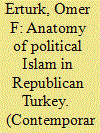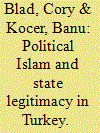| Srl | Item |
| 1 |
ID:
188970


|
|
|
|
|
| Summary/Abstract |
The Milli Görüş political Islamic movement and the first political parties under its banner were founded and dominated by the Naqshbandis. Numerous scholars have so far suggested that political participation has led these groups to transform and moderate their former Islamist views over time. This study examines this possibility by scrutinising how Naqshbandi and Milli Görüş leadership perceive the state, essential political institutions such as the legislature, political parties, opposition, elections, and independent media, together with some defining issues in Islam such as jihad, excommunication, and al-wala’ wa-lbara’ (loyalty and disavowal). In particular, the study seeks to uncover how the Naqshbandi theological background has been turned into a political Islamist ideology through the influence of two important Naqshbandi shaykhs, Mehmed Zahid Kotku (1952–1980) and Mahmud Es’ad Coşan (1980–2001), and two leading Naqshbandi-affiliated Milli Görüş leaders Necmettin Erbakan and R. Tayyip Erdoğan to reveal if/to what extent Islamists’ participation in politics has transformed their Islamist views. As a methodology, content analysis and political discourse analysis have been used. The findings demonstrate a continuity of Islamist Naqshbandi thought in Milli Görüş leadership and that political participation has neither ‘democratised’ nor ‘moderated’ these parties and their radical Islamist thoughts.
|
|
|
|
|
|
|
|
|
|
|
|
|
|
|
|
| 2 |
ID:
111927


|
|
|
|
|
| Publication |
2012.
|
| Summary/Abstract |
The rise of Islamist parties to positions of political dominance in Turkey has been the subject of inquiry for scholars and concern for some American and European observers. This paper argues that this rise of Islamist political efficacy is the result of efforts to maintain state legitimacy in an era of neoliberalism. The integration of neoliberalism as a dominant political economic ideology reduces state economic regulatory capacities and social service endowment. The effect of this retrenchment is a commensurate reduction in state legitimation, as national populations view the state as unable-or unwilling-to meet requisite economic protectionist demands that were formerly exchanged for legitimate support. In an attempt to retain legitimate authority, neoliberal states are forced to move beyond economic protectionist strategies and embrace increasingly cultural legitimation approaches. We juxtapose the use of economic protectionist strategies in the 1945-1980 period with the integration of Islam as a cultural legitimation strategy following the 1980 coup in Turkey.
|
|
|
|
|
|
|
|
|
|
|
|
|
|
|
|
| 3 |
ID:
072158


|
|
|
|
|
| Publication |
2006.
|
| Summary/Abstract |
While both are convinced that "Islam is the solution", Islamists and al-Qaida represent two different views and political strategies. Islamist parties have militant grassroots participation and propose respect for the rule of law and concrete political and social projects. Moreover, the main Arab islamist parties have rejected violence as a means of political struggle. Hamas obtained the government majority by means of fair and free elections. Al-Qaida, instead, offers an undefined political platform: the restoration of an Islamic meta-state through the exhortation to Islamists to join the jihad. The political opportunities represented by the competition between Islamists and jihadists is well understood by some Arab regimes but seems to be less well understood in Western countries.
|
|
|
|
|
|
|
|
|
|
|
|
|
|
|
|
| 4 |
ID:
101347


|
|
|
|
|
| Publication |
2010.
|
| Summary/Abstract |
This article examines the extent to which the Malaysian Islamic Party (PAS) and the Prosperous Justice Party (PKS) are becoming more moderate in their strategy and ideology. The author contends that both parties are struggling over the extent to which they should moderate in response both to strategic incentives present in the Malaysian and Indonesian political systems and to the political learning process whereby both parties are coming to understand the preferences of voters in their respective political systems. This process is complicated by divisions in the parties between pragmatists who would postpone controversial goals to reach out to non-devout voters, and purists who prioritize ideological authenticity.
|
|
|
|
|
|
|
|
|
|
|
|
|
|
|
|